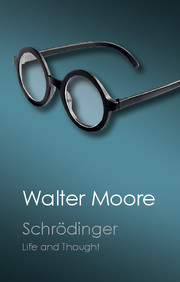Book contents
- Frontmatter
- Contents
- Preface
- Chronology
- Introduction
- 1 Family, childhood and youth
- 2 University of Vienna
- 3 Schrödinger at war
- 4 From Vienna to Zürich
- 5 Zürich
- 6 Discovery of wave mechanics
- 7 Berlin
- 8 Exile in Oxford
- 9 Graz
- 10 Wartime Dublin
- 11 Postwar Dublin
- 12 Home to Vienna
- References
- Name index
- Subject index
- Frontmatter
- Contents
- Preface
- Chronology
- Introduction
- 1 Family, childhood and youth
- 2 University of Vienna
- 3 Schrödinger at war
- 4 From Vienna to Zürich
- 5 Zürich
- 6 Discovery of wave mechanics
- 7 Berlin
- 8 Exile in Oxford
- 9 Graz
- 10 Wartime Dublin
- 11 Postwar Dublin
- 12 Home to Vienna
- References
- Name index
- Subject index
Summary
When the Great War began in August, 1914, Erwin schrödinger at the age of twenty-seven was a Privatdozent at Vienna University, at the outset of a promising career in physics. He served throughout the war as a commissioned officer in the Austrian fortress artillery, first on the Italian front and later assigned to the imperial meteorology department in Vienna. On October 7,1915, his revered professor of theoretical physics, Fritz Hasenöhrl, was killed by a grenade in an Italian attack on Mount Plaut in the South Tirol.
Early in 1918, schrödinger received word that he was being seriously considered for the position of Professor Extraordinarius [associate professor] in theoretical physics at the University of Czernowitz. ‘I made up my mind to lecture there on honest theoretical physics, first of all according to the pattern of the splendid lectures of my beloved teacher Fritz Hasenöhrl, fallen in the war, but besides to concern myself with philosophy, deeply immersed as I then was in the writings of Spinoza, Schopenhauer, Mach, Richard Semon, and Richard Avenarius. My good angel intervened, since soon Czernowitz no longer belonged to us. So nothing came of it. I had to stick to theoretical physics, and, to my astonishment, something occasionally emerged from it.’ Even on active duty, schrödinger found time to read deeply in philosophy, and indeed it was the only thing that kept him from despair during the long years of senseless killing and destruction.
A serious interest in philosophy was not unusual among German and Austrian physicists, but with schrödinger at that time it was so important that he was even tempted to sacrifice scientific research to devote his life to philosophical study. Much later, in 1963, Max Born wrote: ‘I am convinced that theoretical physics is actually philosophy. It has revolutionized fundamental concepts, e.g., about space and time (relativity), about causality (quantum theory), and about substance and matter (atomistics). It has taught us new methods of thinking (complementarity), which are applicable far beyond physics.’ By his discovery of wave mechanics, Erwin schrödinger contributed in a major way to this revolutionary change in our view of the world [Weltanschauunung].
- Type
- Chapter
- Information
- SchrödingerLife and Thought, pp. 1 - 6Publisher: Cambridge University PressPrint publication year: 2015

